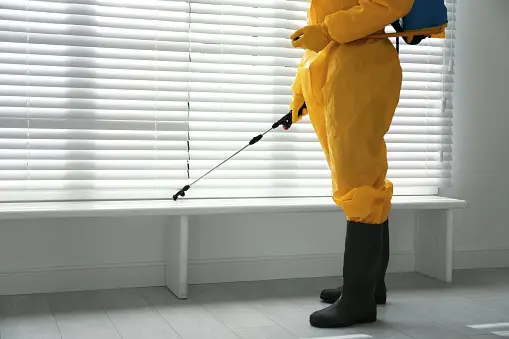In the fight against undesirable pests that invade our homes, gardens, and places of business, it is of the utmost importance to discover the most effective treatments for pest control. These intruders can wreak havoc on our surroundings, putting our comfort, safety, and hygiene at risk. These intruders can range from annoying insects to hardy rats.
Despite this, you can reclaim your space and ensure that your surroundings are free of pests if you are equipped with the appropriate knowledge and tactics.

We will examine a wide variety of methods for controlling pests, ranging from natural cures to cutting-edge technologies, in this all-encompassing book. Our goal is to assist you in determining which methods are the most suitable for your particular circumstance.
Our services are available to you regardless of whether you are suffering from mosquitoes in the yard, termites in the attic, or ants in the kitchen. In this article, we will delve into the topic and reveal the secrets of effective pest management.
What Is The Best Control Pest?
Determining the “best” pest control method depends on various factors such as the type of pest, the extent of infestation, environmental considerations, and personal preferences. Here are some commonly effective pest control methods:
- Integrated Pest Management (IPM): IPM is a holistic approach that combines multiple strategies such as sanitation, exclusion, biological control, and chemical control as a last resort. It focuses on long-term prevention and minimizing environmental impact.
- Biological Control: Introducing natural predators, parasites, or pathogens to control pest populations. This method is eco-friendly and sustainable but may require careful consideration to avoid unintended consequences.
- Mechanical Control: Physical barriers, traps, and barriers can be used to physically remove or deter pests. This method is often effective for rodents, insects, and wildlife.
- Chemical Control: Pesticides are chemical substances designed to kill or repel pests. They should be used judiciously, following safety guidelines and considering potential risks to humans, pets, and the environment.
- Cultural Control: Modifying environmental conditions such as moisture levels, temperature, and vegetation to make the area less hospitable to pests. This method can be effective in preventing infestations.
- Natural Remedies: Many natural substances such as diatomaceous earth, neem oil, and essential oils have repellent or insecticidal properties and can be used as alternatives to synthetic chemicals.
The best approach is often a combination of these methods tailored to the specific pest problem and the individual’s preferences and circumstances. Consulting with a pest control professional can help identify the most effective and appropriate strategies for your situation.
Is Pest Control Effective?
Pest management has the potential to perform marvels when it is carried out correctly. The effectiveness of pest control treatments is contingent upon several factors, including the kind of insect, the degree of infestation, the method of application that is used, and the consistency with which it is maintained.
One of the most effective approaches to dealing with pests is through the implementation of Integrated Pest Management (IPM), which employs a variety of techniques, including sanitation, exclusion, chemical control, and biological control, among others.
Because it places more of an emphasis on prevention than eradication, integrated pest management is more sustainable and less likely to result in infestations in the future.
Another fantastic method for increasing productivity is to make use of the services of a professional pest control company. Contacting professionals who specialise in pest control is the best way to ensure that pest problems are accurately identified, treated, and prevented.
They are equipped with the necessary training, experience, and specialised tools to successfully do the task.
It is important to keep in mind that no treatment for pest control is ever going to be effective and that certain pests may require perpetual management. Furthermore, the effectiveness of pest management can be affected by a variety of factors, including environmental factors, pest resistance, and activities of humans.
Pest management, when carried out appropriately and consistently, has the potential to significantly reduce the number of insect populations, reduce the amount of damage, and improve the quality of life, even though it does not always produce immediate results.
Here are more examples of effective pest control methods:
- Biological Control: Introducing natural predators, parasites, or pathogens to control pest populations. For example, releasing ladybugs to prey on aphids in gardens or using Bacillus thuringiensis (Bt) bacteria to control certain insect larvae.
- Traps and Baits: Various types of traps and baits can effectively capture or kill pests. Examples include snap traps for mice, glue traps for insects, and bait stations for rodents.
- Sealing and Exclusion: Preventing pests from entering buildings or structures by sealing cracks, gaps, and other entry points. This method is particularly effective for keeping out rodents, insects, and other pests.
- Cultural Practices: Modifying landscaping, gardening practices, and storage habits to make the environment less conducive to pests. For instance, removing standing water to prevent mosquito breeding or storing food in airtight containers to deter pantry pests.
- Chemical Control: While chemical pesticides should be used judiciously and as a last resort, they can be highly effective for controlling certain pest populations. Common chemical control methods include insecticides, rodenticides, and fungicides.
- Heat Treatment: Heat can be used to effectively control bed bugs, termites, and other pests. Heat treatment involves raising the temperature of infested areas to levels that are lethal to the pests, effectively eliminating them.
- Fumigation: Fumigation involves the use of gaseous pesticides to eradicate pests in enclosed spaces. It’s commonly used to control stored product pests, wood-destroying insects, and certain household pests.
- Regular Maintenance: Implementing regular cleaning, maintenance, and inspection routines can help detect and address pest issues early on, preventing them from becoming major infestations.
By combining these and other appropriate methods tailored to the specific pest problem, individuals and pest control professionals can effectively manage and control pest populations in various environments.
Conclusion
The execution of an efficient pest management strategy is essential to the preservation of a living or working environment that is both hygienic and comfortable for its inhabitants.
It is possible for individuals as well as experts working in the field of pest management to successfully manage and minimise pest problems by applying a combination of different strategies.
Integrated pest management (IPM), biological control, traps and baits, sealing and exclusion, cultural practices, chemical control (when used appropriately), heat treatment, fumigation, and routine maintenance are some of the approaches that fall under this category.
The most effective results can be achieved by employing an approach that is both comprehensive and individualised, taking into consideration the specific type of pests, the characteristics of the environment, and the preferences of the individual.
Although no one method of pest management can be applied uniformly to all circumstances, the most effective results can be achieved by employing such an approach.
Therefore, it is of the utmost importance to give priority to approaches that are sustainable and friendly to the environment to minimise the harmful impacts on ecosystems and human health. This is because of the reasons stated above.
We can effectively protect our homes, gardens, and places of employment from unwelcome guests if we continue to be vigilant, proactive, and informed of the various effective pest control solutions that are available to us. By doing so, we will make certain that our living environment is safer and healthier for ourselves as well as for successive generations.
For more information, visit pest control bentleigh.
